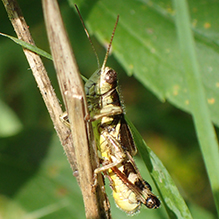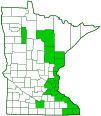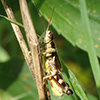Walsh’s locust
(Melanoplus walshii)
Conservation • Description • Habitat • Ecology • Distribution • Taxonomy
Conservation Status |
|
|||||||
| IUCN Red List | not listed |
|||||||
| NatureServe | N4N5 - Apparently Secure to Secure |
|||||||
| Minnesota | not listed |
|||||||
Description |
||
Walsh’s locust, also called Walsh’s short wing grasshopper, is a medium-sized, flightless, spur-throated grasshopper. It occurs in the United States from Pennsylvania to Georgia, west to Minnesota, eastern Kansas, and Mississippi. Adults are found from June through September in upland deciduous woodlands, woodland edges, and thickets. Females are 15⁄16″ to 1 5⁄16″ (24 to 33 mm) in length. Males are a little smaller, 13⁄16″ to 1⅛″ (21 to 28 mm) in length. The body is robust and dark grayish-brown above, yellowish below. The top of the head (vertex) is rounded in profile. The face is dull brown and vertical. The antennae have 22 segments beyond the basal segments (scape and pedicel) and are no more than ½ the length of the body. The back of the head (occiput) is darker. A narrow pale line wraps around the upper part of each compound eye and extends to the back of the head. There is a narrow, often indistinct black stripe behind each compound eye. It is sometimes absent on the female. The saddle-shaped plate covering the thorax (pronotum) is flat above. The rear margin is broadly rounded and extends slightly over the abdomen. The upper side is dark grayish-brown in the middle with a pale stripe on each lateral margin. There is a longitudinal ridge (carina) in the middle that is low but distinct on the rear half, indistinct or absent at the front margin, and absent between. The sides of the pronotum are abruptly angled downward. They are grayish-brown at the bottom with a whitish or pale line at the very top and a broad black or dark stripe below the line. On the underside of the thorax there is a distinct, spiny bump (spur) below at the base of the neck, between the base of the forelegs. The abdomen is compressed. On the male, it is abruptly and distinctly curved upward at the end. The sensory appendages at the end of the abdomen (cerci) are roughly boot shaped. On the female the ovipositor is short. The forewings (tegmina) are lance-shaped and short, usually one-fourth longer than the pronotum, sometimes longer but rarely as long as the abdomen. They are slightly overlapping toward the base, angled toward the rear, and narrowly rounded at the tip. They are unmarked and pale grayish-brown above, dark on the sides. On the hind pair of legs, the robust, third segment (femur) is yellowish-brown or reddish-brown with two black bands on the upper and outer surfaces. The bands are sometimes indistinct on the female. The fourth segment (tibia) is mostly red with a pale band just at the base and a row of 12 or 13 spines. The spines, at least at the tip, are black. On all of the legs, the end section corresponding to the foot (tarsus) has three segments. |
||
Size |
||
Female: 15⁄16″ to 1 5⁄16″ (24 to 33 mm) Male: 13⁄16″ to 1⅛″ (21 to 28 mm) |
||
Similar Species |
||
Habitat |
||
Upland deciduous woodlands, woodland edges, and thickets |
||
Ecology |
||
Season |
||
June through September |
||
Behavior |
||
|
||
Life Cycle |
||
|
||
Larva Food |
||
|
||
Adult Food |
||
|
||
Distribution |
||||
|
Sources Haarstad, J. 1990. The Acrididae of Minnesota. Final report submitted to the Minnesota Department of Natural Resources. 28 pp. |
|||
| 2/13/2023 | ||||
Occurrence |
||||
|
||||
Taxonomy |
|||
Order |
Orthoptera (Grasshoppers, Crickets, and Katydids) | ||
Suborder |
Caelifera (Grasshoppers, Locusts, and Allies) | ||
| Infraorder | Acrididea (Grasshoppers) | ||
Superfamily |
Acridoidea (Short-horned Grasshoppers and Locusts) | ||
Family |
Acrididae (Short-horned Grasshoppers) | ||
Subfamily |
Melanoplinae (Spur-throated Grasshoppers) | ||
Tribe |
Melanoplini | ||
Genus |
Melanoplus (North American spur-throated grasshoppers) | ||
Synonyms |
|||
Melanoplus amplectens Melanoplus blatchleyi Melanoplus occidentalis |
|||
Common Names |
|||
Walsh’s grasshopper Walsh’s locust Walsh's short wing grasshopper |
|||
Glossary
Carina
An elevated keel or ridge.
Femur
On insects and arachnids, the third, largest, most robust segment of the leg, coming immediately before the tibia. On humans, the thigh bone.
Occiput
The back of the head. In Odonata, Megaloptera, and Neuroptera, the upper part of the head behind the eyes.
Pronotum
The exoskeletal plate on the upper side of the first segment of the thorax of an insect.
Tegmen
The modified, leathery front wing of grasshoppers and related insects that protects the hindwing. It may also serve as a camouflage, a defensive display, or a sound board. Plural: tegmina.
Tarsus
On insects, the last two to five subdivisions of the leg, attached to the tibia; the foot. On spiders, the last segment of the leg. Plural: tarsi.
Tibia
The fourth segment of an insect leg, after the femur and before the tarsus (foot). The fifth segment of a spider leg or palp. Plural: tibiae.
Vertex
The upper surface of an insect’s head.
Visitor Photos |
|||||
Share your photo of this insect. |
|||||
| This button not working for you? Simply email us at info@MinnesotaSeasons.com. Attach one or more photos and, if you like, a caption. |
|||||
Babette Kis |
|||||
Melanoplus walshii Walsh's short wing grasshopper Melanoplus walshii, Walsh's short wing grasshopper, taken on Barnes Prairie Remnant 2, Racine County, WI on 8-24-2022. |
 |
||||
MinnesotaSeasons.com Photos |
|||||
|
|||||

Slideshows |
||

Visitor Videos |
|||
Share your video of this insect. |
|||
| This button not working for you? Simply email us at info@MinnesotaSeasons.com. Attach a video, a YouTube link, or a cloud storage link. |
|||
Other Videos |
|||


Created: 2/13/2023
Last Updated:

